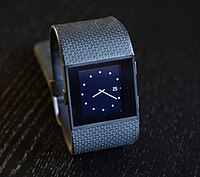
Photo from wikipedia
Sleep and physical activity are both important to health, but the demands of our modern schedule often require individuals to choose one over the other. In adolescents, the association between… Click to show full abstract
Sleep and physical activity are both important to health, but the demands of our modern schedule often require individuals to choose one over the other. In adolescents, the association between objectively measured sleep and physical activity is not well established in the literature. The aim of current study was to assess associations between free-living and physical activity and sleep among 15-year-old adolescents. Free-living physical activity and sleep were assessed with wrist-worn accelerometers, sleep diary, and questionnaires during a 7-day period including school days and non-school days in 270 (161 girls) adolescents (mean age 15.8±0.3y) in Reykjavik, Iceland. Linear regression analysis was used to explore the associations between objectively measured physical activity and sleep. T-test was used to determine if there is a significant difference in objectively measured sleep between those who reported sports or exercising <6 versus ≥6 h/week. Weekly mean physical activity (2040±466 counts/min of wear/day) was negatively associated with total sleep time (6.6±0.64 h/night) (β±SE=-3.5±0.7, p<0.001). However, physical activity was also negatively associated with minutes of wake after sleep onset on non-school days (p=0.047) and standard deviation (i.e. night-to-night variability) of total sleep time over the week (p=0.028). Subjects who reported exercising ≥6 h/week (n=116) had lower night-to-night variability in bedtime (41.2±27.9 min) than those who did not (49.8±37.5 min), p=0.033. The negative association between physical activity and sleep duration suggests that in more active individuals’ physical activity may be displacing sleep. However, greater physical activity is also associated with fewer minutes of awakening and a less variable sleep schedule, indicating better sleep quality. These findings suggest that physical activity is important for good sleep quality, but students should more closely consider sleep guidelines when designing an exercise schedule. Future studies should test how change in sleep patterns might influence physical activity. Icelandic Centre for Research, National Institute of Diabetes and Digestive and Kidney Diseases.
Journal Title: Sleep
Year Published: 2020
Link to full text (if available)
Share on Social Media: Sign Up to like & get
recommendations!